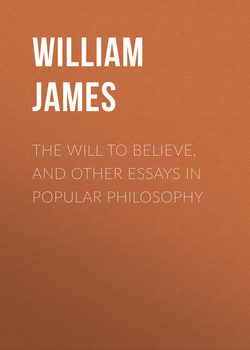The Will to Believe, and Other Essays in Popular Philosophy

Реклама. ООО «ЛитРес», ИНН: 7719571260.
Оглавление
William James. The Will to Believe, and Other Essays in Popular Philosophy
PREFACE
THE WILL TO BELIEVE.2
IS LIFE WORTH LIVING?7
THE SENTIMENT OF RATIONALITY.9
REFLEX ACTION AND THEISM.14
THE DILEMMA OF DETERMINISM.24
THE MORAL PHILOSOPHER AND THE MORAL LIFE.36
GREAT MEN AND THEIR ENVIRONMENT.39
THE IMPORTANCE OF INDIVIDUALS
ON SOME HEGELISMS.57
WHAT PSYCHICAL RESEARCH HAS ACCOMPLISHED.61
INDEX
Отрывок из книги
In the recently published Life by Leslie Stephen of his brother, Fitz-James, there is an account of a school to which the latter went when he was a boy. The teacher, a certain Mr. Guest, used to converse with his pupils in this wise: "Gurney, what is the difference between justification and sanctification?—Stephen, prove the omnipotence of God!" etc. In the midst of our Harvard freethinking and indifference we are prone to imagine that here at your good old orthodox College conversation continues to be somewhat upon this order; and to show you that we at Harvard have not lost all interest in these vital subjects, I have brought with me to-night something like a sermon on justification by faith to read to you,—I mean an essay in justification of faith, a defence of our right to adopt a believing attitude in religious matters, in spite of the fact that our merely logical intellect may not have been coerced. 'The Will to Believe,' accordingly, is the title of my paper.
I have long defended to my own students the lawfulness of voluntarily adopted faith; but as soon as they have got well imbued with the logical spirit, they have as a rule refused to admit my contention to be lawful philosophically, even though in point of fact they were personally all the time chock-full of some faith or other themselves. I am all the while, however, so profoundly convinced that my own position is correct, that your invitation has seemed to me a good occasion to make my statements more clear. Perhaps your minds will be more open than those with which I have hitherto had to deal. I will be as little technical as I can, though I must begin by setting up some technical distinctions that will help us in the end.
.....
But now, since we are all such absolutists by instinct, what in our quality of students of philosophy ought we to do about the fact? Shall we espouse and indorse it? Or shall we treat it as a weakness of our nature from which we must free ourselves, if we can?
I sincerely believe that the latter course is the only one we can follow as reflective men. Objective evidence and certitude are doubtless very fine ideals to play with, but where on this moonlit and dream-visited planet are they found? I am, therefore, myself a complete empiricist so far as my theory of human knowledge goes. I live, to be sure, by the practical faith that we must go on experiencing and thinking over our experience, for only thus can our opinions grow more true; but to hold any one of them—I absolutely do not care which—as if it never could be reinterpretable or corrigible, I believe to be a tremendously mistaken attitude, and I think that the whole history of philosophy will bear me out. There is but one indefectibly certain truth, and that is the truth that pyrrhonistic scepticism itself leaves standing,—the truth that the present phenomenon of consciousness exists. That, however, is the bare starting-point of knowledge, the mere admission of a stuff to be philosophized about. The various philosophies are but so many attempts at expressing what this stuff really is. And if we repair to our libraries what disagreement do we discover! Where is a certainly true answer found? Apart from abstract propositions of comparison (such as two and two are the same as four), propositions which tell us nothing by themselves about concrete reality, we find no proposition ever regarded by any one as evidently certain that has not either been called a falsehood, or at least had its truth sincerely questioned by some one else. The transcending of the axioms of geometry, not in play but in earnest, by certain of our contemporaries (as Zöllner and Charles H. Hinton), and the rejection of the whole Aristotelian logic by the Hegelians, are striking instances in point.
.....